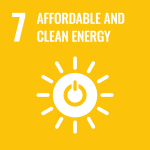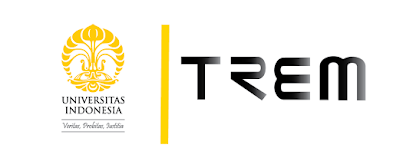After water and food, energy is one of the key enablers of human life. Energy is central to nearly every major challenge and opportunity the world faces today and access to energy for all is essential. But energy needs to be available and affordable to all to allow future development, and it needs to be clean in order to ensure that the development can be sustainable.
THE Impact Rankings Methodology 2022, p. 86

Energy-efficient renovation and building at Faculty of Medicine
Most rooms in Faculty of Nursing UI use sunlight as source of light on day time. Moreover, the windows in the rooms can be opened to allow natural air transfer in and out of the rooms. In addition, plants are used as hedges in parking area to reduce direct pollution from motor vehicle. Faculty of Nursing UI Building is also surrounded by propagating plants that adds to the greeneries in Faculty of Nursing UI perimeter. Plants are also found in every building in every floor and in some of the rooms.
Faculty of Nursing UI also has a policy concerning green building program. This policy is declared in Universitas Indonesia Faculty of Nursing Dean’s Decree No.5670/UN2.F12.D/HKP.02.04/2018 concerning Implementation of Go Green Faculty of Nursing UI Policy point f. At present, this policy is being socialized to all Faculty of Nursing UI campus community members.
Rector’s Decree No. 1310/SK/R/UI/2011 concerning Energy Conservation in Universitas Indonesia
Upgrade buildings to higher energy efficiency at Universitas Indonesia
Upgrade buildings to higher energy efficiency at Faculty of Medicine
Upgrade buildings to higher energy efficiency at Faculty of Psychology
Carbon reduction and emission reduction process at Faculty of Psychology
Universitas Indonesia has an energy efficiency plan to reduce total energy consumption.
Referring to Rector’s Decree No. 1310/SK/R/UI/2011, Universitas Indonesia published Rector’s Decree 1327 concerning Management and Usage of Electricity in Universitas Indonesia Area. Universitas Indonesia also released Pamphlet on Outage in Campus Area Schedule. This pamphlet is intended to support and raise awareness to staff and students on energy efficiency plan to reduce energy usage in total. Universitas Indonesia will apply Printing Pool Planning or Printer Sharing Management for buildings under Campus Administration Centre. This is to reduce electricity cost by reducing or eliminating personal printer and scanner. Moreover, Faculty of Psychology has used all-in-one PC to reduce electricity consumption in the faculty. All-in-One PC requires lower electricity and is more comfortable for setting.
Universitas Indonesia always monitors energy usage in campus to identify areas with highest energy lost. Extensive electricity usage is hard to avoid, particularly at institution or company level where electricity consumption is hard to monitor due to the vast volume of users. Universitas Indonesia (UI) as a green campus concern about environment has a unique website as a solution for this problem, namely https://sinergi1.ui.ac.id/ems_ui/
Energy and Sustainability Monitoring System Universitas Indonesia (Sinergi) is Universitas Indonesia’s official information source that can provide information on electricity consumption in every working unit (Faculty Administration Centre and University). This information is accessible for public.
Sustainability Monitoring System Universitas Indonesia (Sinergi)
Universitas Indonesia is committed to provide programs for local community to learn about the significance of energy efficiency and clean energy through various community service programs. These programs propose collaborative efforts between related government entity, researcher and local community to identify the root of problem concerning availability of affordable, reliable and sustainable energy for all. Through community service activities, social innovation is transpired so that science and technology developed in academic sector can be applied in collaboration with the public.
Local community outreach for energy efficiency Program at Universitas Indonesia
Pulau Binongko is categorized as a remote area. One of the problems occurred here is the inadequate electricity. The only Diesel-Powered Electric Generator (PLTD) in the island does not have sufficient capacity for operation in two district areas. This resulted in the inability of the PLTD to operate electricity 24 hour a day for the two administrative areas and the solution most often taken is alternating outage. In addition to electricity problem, Wakatobi also has a problem concerning plastic waste management with the discovery of a dead Sperm Whale stranded at the shore in Wakatobi city with 5.9 kg plastic found in its stomach.
Alternative Energy to Support Development of Remote Area Literacy
Renewable energy production implemented in Faculty of Medicine at present is solar cell used for street lamp.
Faculty of Engineering has developed renewable energy production inside Faculty of Engineering campus by using Solar Cell 0.3 kWpeak, 50 kWpeak capacity Solar Cell, 3 kWpeak capacity Solar Cell, and 5kW Fuel Cell.
Universitas Indonesia also implements various steps in creating renewable energy in some UI Depok Campus areas such as UI Mosque. There is also Bifacial Floating Solar Powered Electric Generator (PLTS) and other types of renewable energy.
Development of Renewable and Environment Friendly Energy at Universitas Indonesia Depok Campus
The Faculty of Nursing has Solar Panels as Solar Cell that generates 18000 kVA of energy. It was built to save energy and in order to support green metrics. The solar cell is connected to an electrical panel so that the energy it generates can be used to reduce the electricity usage load in Faculty of Nursing.
Energy efficiency for services and industry at Universitas Indonesia
Research Center for Climate Change – University of Indonesia (RCCC – UI)
Through Rector’s Decree concerning projects winning competitive internal funding in 2019, Universitas Indonesia (UI) commits to actively facilitate researches and producing output to support the government in development of clean energy policy and energy saving technology. The university also provides internal fund and becomes partner of external entities, including government agencies, non-governmental organization and companies to support study concerning this matter. UI also has three research centers: Research Center for Climate Change (RCCC), Tropical Renewable Energy Center (TREC), and Center for Sustainable Infrastructure Development (CSID), founded respectively in 2010, 2015 and 2014. UI’s efforts in producing affordable and clean energy is not only synchronized with SDG 7 (Attainable and Clean Energy); they are also attached to SDG 9 (Industry, Innovation, and Infrastructure), SDG 11 (City and Sustainable Community), and SDG 13 (Climate Action).
Policy Development for Clean Energy Technology of Universitas Indonesia
Supporting the government in developing clean energy policy and energy saving technology, Universitas Indonesia forms UI Lestari Campus Development Task Force through Rector’s Decree Universitas Indonesia No. 1493 of 2020.
Universitas Indonesia provides assistance to start-ups encouraging and supporting low carbon economy/technology.
UI is committed to actively produce various start-up programs in line with national and global efforts to create source of affordable and clean energy. The university also provides internal fund and joins partnership with external entities including government agencies, non-governmental organization and companies to encourage study concerning this matter.
UI also has three research centers: Research Center for Climate Change (RCCC), Tropical Renewable Energy Center (TREC), and Center for Sustainable Infrastructure Development (CSID), and Scientific Modeling, Application, Research, and SMART CITY,
Reduction of Glass House gas emission in FIK UI perimeter programs are among others energy saving programs, motor vehicle reduction, plastic usage reduction, paper usage reduction, organic waste treatment, and reforestation in collaboration with the students.
Reduction of electricity is proceeded by usage of energy saving lamps, motion sensor lamps, and the call for turning off electricity. In addition, electricity usage reduction can also be implemented by alternatingly activate elevator in between semester period when learning process is inactive and turn off elevator on holidays. Furthermore, in this pandemic period, FIK also only activates 1 elevator on weekdays.
To reduce CO2 and Nitrite Oxide (N2o) emission from fossil fuel burning, FIK UI provides faculty bicycle and UI bicycle as a means of transportation for the campus community members. Beside glass house gas reduction program through reduction of electricity and bicycle use, FIK UI also starts to reduce plastic usage by prohibiting the use of plastic straw in campus, usage of tumbler and participation in loving UI campus by utilizing plastic as basic material for making fashion show clothing. This is performed due to increase of glass house gas emission (methane and ethylene) when plastic is exposed to sunlight. Total emission of glass house gas can be generated from deforestation of forest as the source of paper materials. Therefore, to reduce the effect of glass house gas emission, FIK calls for reduction of paper towel, usage of both side of paper in printing document draft and usage of used paper as envelopes. In addition, before the Pandemic, during PSAF, FIK UI freshmen are involved in escalating reforestation by bringing plants to campus in order to reduce CO2.
GO GREEN FIK UI activities is supported by the policy of Go Green FIK UI Implementation specified in Dean’s Decree No. 5670/UN2.F12.D/HKP.02.04/2018.
Total energy consumption
–
University floor space
–
Total energy consumption per sqm
–
Select an image for which you want to see the achievement of the SDG indicators
